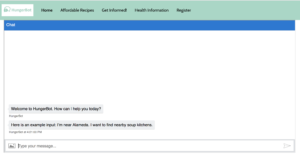UC Berkeley students create app that locates, rates nearby food pantries
1 in 5 UC Berkeley students skip meals to save money. Yet, only a fraction of these students will ever step foot in a food pantry because of the stigma that surrounds getting help.
But a team of students from a UC Berkeley class on internet and data privacy are trying to change that. Eric Dang, Rodrigo Palmaka, Max Moilanen, Arsh Vishen, Arundishaan Kanagaraja and Maringanti Anand have worked this semester to create an app called HungerBot –– a vast database of food pantries that can help people who are food insecure find resources near them and rate their experience completely anonymously.
“The USDA defines food insecurity as as ‘a lack of consistent access to enough food for an active, healthy life’” Vishen said. “But we know that food insecurity is more than just a definition. It’s a problem that affects our family, our friends, and our fellow bears.”
Right now, if you go online and search for food resource centers on Google or through social media, that search history doesn’t stay private. It will be collected and potentially used by advertisers to provide you with targeted ads.
The students decided to create HungerBot to protect people’s privacy when it comes to the very personal topic of food insecurity.
Additionally, many rating services like Yelp and Facebook require that you give your name or other information in order to leave a review. Because of these factors, the students on the team found that there was limited information about the quality of food pantries online.
Because HungerBot is completely anonymous, there’s less risk to leaving a review. This feature encourages people to offer more information about their experience with a food pantry, creating a better online tracker of specifics about what each resource center is like.
The students on the team hope that the app, through eliminating privacy concerns, will begin making people more likely to seek help if they do not have enough to eat.
“70 percent of those in the lowest income bracket have a smartphone,” Vishen said. “This is a cool technological tool you can use to find food banks, and we think that it will change the attitude around food insecurity.”
The students created HungerBot after conducting 75 one-on-one interviews with UC Berkeley students and collecting information from anonymous surveys they posted online. They plan to start by targeting students on college campuses and expand outward from there, operating as a nonprofit.
HungerBot was selected from among seven other projects created in Professor Leah Edwards’ Internet and Data Privacy Challenge Lab to continue on to the Sutardja Center for Entrepreneurship and Technology’s Collider Cup, where young entrepreneurs pitch their startups and compete against other top projects developed in SCET classes.
Edwards said that the students in her class had a particularly tough road to developing business ideas in her class because data privacy is a field that’s just now starting to erupt.
Many students who conducted interviews and surveys toward the beginning of the class found that people didn’t understand the risks of giving away their personal information on the web. They were perfectly content to giving away data like their birthday or names in order to use services like Facebook.
“In class, I led them through who might be the early adopters and who might be the people already known of the need for data privacy.” Edwards said. “[Food insecure people] would be a group that would have more sensitivity to privacy.”
But Edwards also noted that she thinks it’s only a matter of time before data security is an issue that’s on everybody’s mind –– not just those who have heightened needs for privacy.
Just throughout the course of the semester there were several major news events related to data privacy, most notably, Facebook’s huge data scandal in which consulting company Cambridge Analytica was shown to have used the platform to harvest personal information from 87 million people to influence voter opinions during the 2016 presidential election.
“I was really excited to teach this class because I feel like this generation will be the one to provide solutions (for data privacy),” Edwards said. “They’re going to be so much better prepared when they have jobs to think about the ramifications of decisions that are good for business and to take a broader human perspective to think about how to not make these privacy mistakes.”

